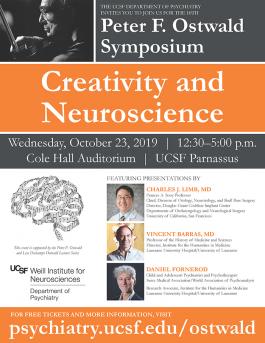The Peter F. Ostwald, MD, and Lise Dechamps Ostwald Lecture Series began in 1999 to honor the late Professor Peter F. Ostwald, MD, who served as a faculty member in the UCSF Department of Psychiatry for four decades. The lecture series is focused on exploring the relationship between artistic creativity and the human brain, particularly music and its connection with behavioral health.
The 10th Peter F. Ostwald Symposium: "Creativity and Neuroscience"

The University of California, San Francisco Department of Psychiatry hosted the most recent Peter F. Ostwald Symposium on October 23, 2019, in Cole Hall Auditorium on the UCSF Parnassus Heights campus.
This half-day event, titled "Creativity and Neuroscience" featured a keynote address by UCSF faculty member Charles Limb, MD, a hearing specialist, surgeon, and musician who studies the way our brains create and perceive music. Additional remarks were delivered by Vincent Barras, MD, and Daniel Fornerod, both from the University of Lausanne's Institute for the Humanities in Medicine, on Peter Ostwald's contributions to the history of medicine.
Selected previous lecture topics and keynote speakers
- 2013 - "Music as Exercise for the Well-Tempered Mind" (Nina Kraus, PhD)
- 2010 - "Eve's Flute: Psychobiological and Social Influences on the Neglect of Women Composers" (Joana Carneiro; Susana Winkel, PhD; Leonard Zegans, MD)
- 2007 - "The Neurobiology of Human Consciousness" (Christof Koch, PhD; Giulio Tononi, MD, PhD)
- 2006 - "How Far Brain Plasticity?" (Mringanka Sur, PhD; Bruce Wexler, MD; Robert Zatorre, PhD)
- 2001 - "Mahler in Vienna at the Time of Freud" (Michael Tilson Thomas; Leonard Zegans, MD)
- 2000 - "Bach, Childhood Loss, and the Power of Unity in Diversity" (Leonard Zegans, MD)
- 1999 - "Robert Schumann, Illness and Creativity: Twilight Works of Genius or Madness?" (Deborah Hayden; Bruce Miller, MD; Pierre Vachon)
About Peter F. Ostwald, MD

Peter F. Ostwald, MD
Peter F. Ostwald, MD, was an eminent psychiatrist, an author of ten books and more than 185 published articles, and an accomplished researcher who studied the effects of emotion on speech and hearing, and pioneered the use of acoustic spectrographic methods known as "voiceprints." His prolific and distinguished career at UC San Francisco spanned four decades before his passing in 1996 at the age of 68.
Born in Berlin, Ostwald received his medical degree from UCSF in 1950 and completed his internship at San Francisco General Hospital. Following a residency in New York and service with the Army Medical Corps in Germany, he returned to the university in 1956 to join the staff of the Langley Porter Psychiatric Institute, where he rose through the ranks to become a professor of psychiatry in 1970.
A lifelong musician and skilled violinist, Ostwald was recognized internationally for his work on the interaction between music and psychiatry. His pioneering psychobiography of Robert Schumann, Schumann: The Inner Voices of a Musical Genius (1985), was the first work to attempt an exact diagnosis of Schumann's severe mental disorders as they related to his compositions and creative life. The acclaimed book received the ASCAP Deems Taylor Award in 1986 and led to his being invited to translate Schumann's diaries into English. The first volume, Marriage Diaries of Robert and Clara Schumann, appeared in 1993.
In 1991, Ostwald published a biography of the 20th century's most famous ballet dancer, Vaslav Nijinsky: A Leap into Madness. Based on original research, the book shed new light on the dancer's family, his youth, and the final third of his life, which Nijinsky spent under psychiatric care. In recognition of his work, Ostwald was named as one of the first American recipients of the Polish Artists Agency's Vaslav Nijinsky Medal in 1994. His final biographical work, Glenn Gould: The Ecstasy and Tragedy of Genius, was published posthumously to widespread acclaim in 1997.
Ostwald founded the UCSF Health Program for Performing Artists, a voluntary group of medical specialists devoted to research, education, and clinical care of health problems and disabilities afflicting musicians, dancers, actors, and other performing artists. It was the first program was the first in the western U.S. dedicated to the nascent field of performing arts medicine, now an internationally recognized medical specialty. In addition, he contributed the chapter on psychiatric disabilities to the groundbreaking Textbook of Performing Arts Medicine (1991) and served as an editor and frequent contributor to the journal Medical Problems of Performing Artists.
He was honored by the UC Regents with the prestigious J. Elliot Royer Award in 1991 for his distinguished service to the field of psychiatry. That same year, Ostwald also received the Northern California Psychiatry Society's Outstanding Achievement Award. He was a Life Fellow of the American Psychiatric Association and a member of many other professional organizations, including the American College of Psychiatrists and the Northern California Psychiatric Society. In 2010, the University of Music and Dance in Cologne, German opened the Peter Ostwald Institute, an academic center dedicated to the study of performance arts medicine.
Ostwald's professional work was greatly enriched by his lifelong love of music. He frequently performed chamber music and other works at informal musical evenings, numerous concerts, and lecture recitals with his wife, concert pianist Lise Deschamps Ostwald. For many years, he served as mental health consultant to the San Francisco Conservatory of Music, and held workshops for students at the San Francisco Community Music Center, San Francisco Opera Center, National Ballet School of Canada, and other arts organizations. He also served on the board of the San Francisco Performing Arts Library and Museum.
Former department chair Leon Epstein, MD, PhD, said of his long-time colleague and friend, “Dr. Ostwald's love of music illuminated his life. In his academic career, he creatively combined his psychiatry and his gift for music. He was happy both in his chosen career and his home.”





